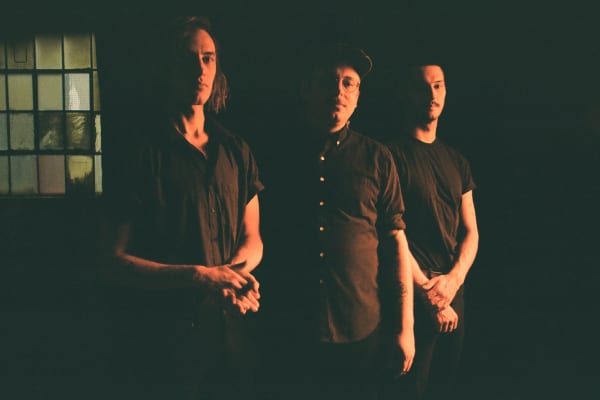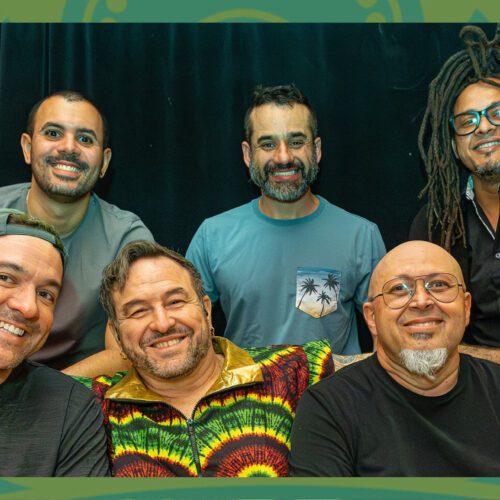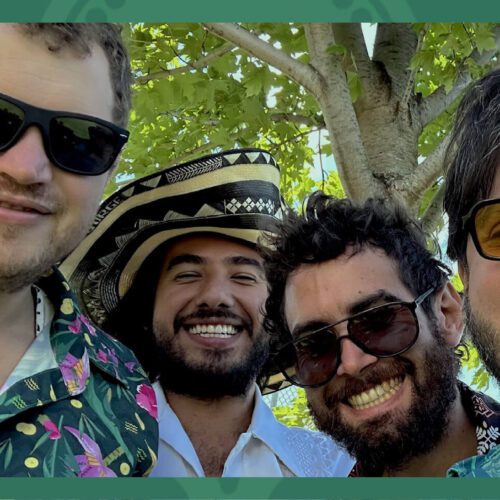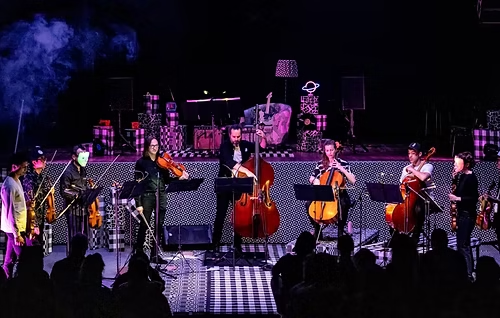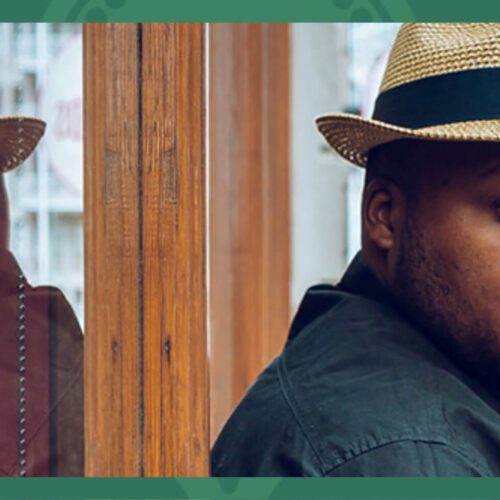Additional Information
With two EPs in the bag in addition to a split released last year with Japanese legends Acid Mothers Temple, Yoo Doo Right concretizes its cosmic epopee with a long-awaited first album under the cryptic title Don’t Think You Can Escape Your Purpose. As true romantic warriors, the trio demonstrates on this album a mastery of the striking force of Can and NEU! as well as the art of hermetic phoenixology of the Berlin school – Tangerine Dream, Ash Ra Tempel – while remaining as relevant as their contemporaries 10 000 Russos, or Gnod and their album JUST SAY NO TO THE PSYCHO RIGHT-WING CAPITALIST FACIST INDUSTRIAL DEATH MACHINE. To better understand what’s behind the deterministic title, PAN M 360 met with guitarist Justin Cober and bassist Charles Masson, who welcomed us at their small workshop, Mile End Effects, not far from the Godspeed! headquarters, where condos are growing like bad weeds. Located in an old building said to have been used as a weapons factory during WWII (and possibly haunted by a ghost from that same era), Cober set up his own workshop to build a completely different form of electric weaponry: effects pedals.
Crédit: Delphine Snyers, Justin Cober
PAN M 360 : Your first EP was released in 2016, but before that, there’s not much information about the band. So, first thing first, when did the three of you meet each other, and when did you start playing together?
Charles Masson: About 10 years ago, Justin was living in Toronto and I was in Montreal. A show was set up for my band in Toronto and I immediately clicked on Justin’s band called New Wings. We kept contact after that. About six or five year later, Justin moved to Montreal and brought his new friend John, who’s from Edmonton and was living in Montreal to study. We started playing together and started the band right away. Three month later, we were playing our first show.
PAN M 360: Where did you play your first show?
Charles Masson: It was in a DIY venue in Pointe-Saint-Charles called Bad Lunch. It was with two jazz bands. It was on the last floor of a house, in a tiny mezzanine, it was very small and very strange but it was a very nice first show. DIY spaces are what we prefer.
PAN M 360: Your music tends to create a sort of wall of sound on stage by using amps from the ’70s and effect pedals, almost reaching the dangerous level of 140 dB. What made you want to reach this heavy volume?
Justin Cober: I mean, it’s transcendental, really. When you’re actually able to feel the vibrations of this ball of fury coming from a stage, it’s so overwhelming. It’s quite magical.
Charles Masson: We got so used to it while practicing at these high volumes. We created textures that won’t come out as much as we would have liked when you turn the volume down. Our songs are created for high volumes, it’s hard to compromise about that. Somebody said, finally, a Yoo Doo Right album – we can finally turn the fuck down.
Justin Cober: I would kind of quote Kevin Shields, when he was talking about My Bloody Valentine’s stage volume. He was basically saying that, when they were first rehearsing, they were playing at volumes that enters you into this kind of trance state. By the end their rehearsals, they would all be laughing in a state of euphoria. That’s a very apt description of how it feels. When we’re playing sometimes, we finish a song and we kind of sit back, take a few breath and we’re all just laughing. It feels really good. We’re all pretty soft-spoken people, so I think it’s really cool to be that much of a force, it’s like a voice outside of our own. Having your eyeballs vibrating inside your head… Hearing certain frequencies at such devastating volumes is just a ton of fun. If that’s not magic, I’m not sure what is.
PAN M 360: Your music is notably influenced by the German krautrock movement from the ’70s and its rhythmic patterns. What did you find interesting in this period of German culture?
Justin Cober: A lot of it has to do with the sociopolitical climate of Germany in the late ’60s. In North America and particularly on the West Coast of the United States, there was this whole hippy movement that was born out of a rejection of their parents’ view point of the world. But in Germany, it seemed to be a lot more of a rejection of what their parents stood for. If they weren’t actively engaged in the Nazi mindset, they were at least complicit in a lot of that. As they were rebuilding the structures of Germany, and the bombed-out cities, they also decided to rebuild a cultural identity. It was ferociously political and anti-fascist. There were a lot of interesting collectives which could be considered domestic terrorists, they were just hellbent on rebuilding Germany in a way their parents couldn’t. That for me really stuck out. I feel history tends to repeat itself. We have constantly found ourselves in situations where people are being commodified and oppressed. I really appreciate this feeling that was found in krautrock. And it’s also very good music.
PAN M 360: How do you think the German psychedelic movement differs from the American countercultural movement?
Justin Cober: For better or for worse, the counterculture movement in the USA was very much an aesthetic thing. When you look now, all the anti-capitalist hippies grew up in their own big corporations and are still fucking up the world. A lot of it had to do with the very thin veil of image and aesthetic whereas in Germany I think it was a lot deeper than that, it meant a lot more than just putting flowers in people’s hair, listening to The Byrds or whatever.
PAN M 360: Their message was indeed much more political. Amon Düül even once said that he wanted to perform for free in factories at some point, for example.
Justin Cober: Even in the way all that music sounds, it can be very harsh and industrial. There is that sort of statement being made in a sonic way. It’s almost like two tectonic plates shifting and grinding against each other. It’s like creating this primordial rebirth of culture and mentality.
PAN M 360: Your album title Don’t Think You Can Escape Your Purpose is a strong statement, particularly for artists. In a way, this reminds me of Julian Cope saying that Krautrock was an “Explore-the-god-in-you-by-working-the-animal-in-you Gnostic Odyssey”. Do you identity with this statement?
Justin Cober: In a way, yes. The idea is about building a life for ourselves that we don’t need to escape from, finding purpose and meaning in endeavours that aren’t necessarily considered to be viable financially in terms of a carrier. Or considering whether or not you’re a productive member of society under very specific capitalistic means. We’re trying to find value and fulfillment in our communities and in our personal endeavours that make us wake up in the morning. You’re finding purpose in yourself, not by working for someone else and doing something you absolutely hate, being exploited and valued for your monetary worth. It’s a very good quote and it very much connects to the album, I guess.
PAN M 360: What does it look like for each one of you to build a life that you don’t need to escape from?
Charles Masson: I’ve been unemployed for the last two years and I’ve been trying to make my way out of this situation by creating my own little company, possibly a little grocery store. You have to be able to take some steps back to see what is attracting you to your actual life endeavours.
Justin Cober: Injecting as much purpose and intention into what you’re doing as an extension of who you are as a person, and finding a way to be able to do that. Charles and I are in a very privileged position in a sense that we have been able to work towards something that we love to do. It’s a very nice place to be. Good for you if you have the means to try and follow what you think your purpose is in life. A lot of people don’t have that. There is no delusion there, but we’re trying to promote this idea that people are worth a lot more than their day jobs or the worth placed on them in a capitalist sense. Passions and feelings are more valuable than the paycheques they bring in despite obviously needing to exist in this framework that we exist in.
PAN M 360: In the video for the title song, you used the movie Cosmic Zoom by Eva Szasz. It well illustrates the lyrics that are about someone trying to find something bigger than themselves, during a moment of insanity where they lost touch with reality. Would you like to elaborate?
Justin Cober: The lyrics are about somebody who thinks that they are basically an ambassador for humans on our planet to some extraterrestrial community. It’s very much born out of their mental illness. They just wait to be beamed up, but they increasingly grow more paranoid that people are going to find out their secrets.
PAN M 360: You also say that this person has been chosen to solve the problems of our species. To you, what would be the problems that this person has to face?
Charles: The rambling of people who don’t know shit.
Justin Cober: How many hours do you have? Fuck, I don’t think we need to count the ways so to speak. There are so many problems that we face and that we have always faced. There is a bit more immediacy. Every time I meet another dilemma that our species and every other species of this planet encounters, my thought processes are like little rivers that all go into the same big ocean that is our ending doom. We are so fucked. There are so many things we have to face and it’s heart-breaking to think about it. The solutions are driven by the exact same thing that are getting us into this predicament. The ground we sit on is based on this idea of oppression and harming people to gain for ourselves.
Charles Masson: In the name of growth.
Justin Cober: The moment our care for others was over ridden by this idea of growth and what it means to be successful, it’s when we became doomed, we enslaved people and animals. How do you take a step back and realize that it is at the basis of these problems that we face? The commodification of life is fucked up, it’s hard to think about it. A lot of people don’t think about it, because they would rather not and I understand that.
PAN M 360: Another way to see it is that if something doesn’t work out biologically in nature, nature tends to get read of it. So, if our species has to disappear, it could be according to nature’s rules.
Justin Cober: There is this amazing George Carlin quote: “Mother Earth, the planet, is gonna be here, its gonna be fine. We’re the ones who are fucked. The planet is gonna sneeze us off like a bad cold”. The planet is probably gonna be here. If its inhabitable for us is another story. Maybe that could be the best thing. Maybe our species dying is like the Earth overcoming cancer and going into remission.
PAN M 360: To finish on a lighter note, after finding your purpose, what is the next step for Yoo Doo Right?
Justin Cober: We’ll keep just jamming.

